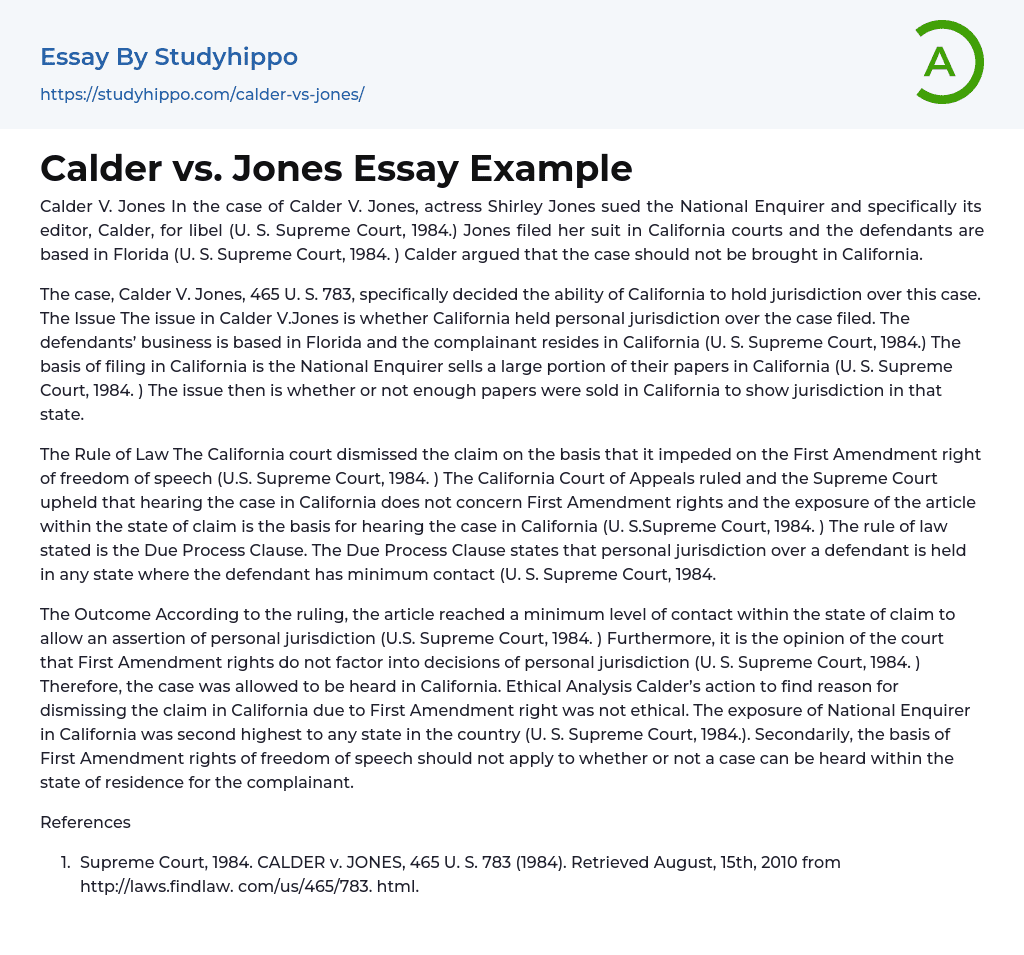Calder V. Jones In the case of Calder V. Jones, actress Shirley Jones sued the National Enquirer and specifically its editor, Calder, for libel (U. S. Supreme Court, 1984.) Jones filed her suit in California courts and the defendants are based in Florida (U. S. Supreme Court, 1984. ) Calder argued that the case should not be brought in California.
The case, Calder V. Jones, 465 U. S. 783, specifically decided the ability of California to hold jurisdiction over this case. The Issue The issue in Calder V.Jones is whether California held personal jurisdiction over the case filed. The defendants’ business is based in Florida and the complainant resides in California (U. S. Supreme Court, 1984.) The basis of filing in California is the National Enquirer sells a large portion of their papers
...in California (U. S. Supreme Court, 1984. ) The issue then is whether or not enough papers were sold in California to show jurisdiction in that state.
The Rule of Law The California court dismissed the claim on the basis that it impeded on the First Amendment right of freedom of speech (U.S. Supreme Court, 1984. ) The California Court of Appeals ruled and the Supreme Court upheld that hearing the case in California does not concern First Amendment rights and the exposure of the article within the state of claim is the basis for hearing the case in California (U. S.Supreme Court, 1984. ) The rule of law stated is the Due Process Clause. The Due Process Clause states that personal jurisdiction over a defendant is held in any state where the defendant has minimum contact (U. S. Supreme Court, 1984.
The Outcom
According to the ruling, the article reached a minimum level of contact within the state of claim to allow an assertion of personal jurisdiction (U.S. Supreme Court, 1984. ) Furthermore, it is the opinion of the court that First Amendment rights do not factor into decisions of personal jurisdiction (U. S. Supreme Court, 1984. ) Therefore, the case was allowed to be heard in California. Ethical Analysis Calder’s action to find reason for dismissing the claim in California due to First Amendment right was not ethical. The exposure of National Enquirer in California was second highest to any state in the country (U. S. Supreme Court, 1984.). Secondarily, the basis of First Amendment rights of freedom of speech should not apply to whether or not a case can be heard within the state of residence for the complainant.
References
- Supreme Court, 1984. CALDER v. JONES, 465 U. S. 783 (1984). Retrieved August, 15th, 2010 from http://laws.findlaw. com/us/465/783. html.
- Business Law essays
- Contract essays
- Consumer Protection essays
- Property essays
- Ownership essays
- Agreement essays
- Common Law essays
- Contract Law essays
- Justice essays
- Security essays
- Tort Law essays
- United States Constitution essays
- Crime essays
- Lawsuit essays
- Treaty essays
- Family Law essays
- Marijuana Legalization essays
- Constitution essays
- War on Drugs essays
- Court essays
- Jury essays
- Police essays
- Protection essays
- Community Policing essays
- Criminal Law essays
- Judge essays
- Lawyer essays
- Employment Law essays
- Copyright Infringement essays
- Injustice essays
- Intellectual Property essays
- Breach Of Contract essays
- Jurisprudence essays
- Social Injustice essays
- Juvenile Justice essays
- Internet Privacy essays
- Cyber Security essays
- Bill Of Rights essays
- Civil Liberties essays
- First Amendment To The United States Constitution essays
- Fourth Amendment To The United States Constitution essays
- Second amendment essays
- Animal Cruelty essays
- Law Enforcement essays
- Juvenile Justice System essays
- Surveillance essays
- Forensic Science essays
- Crime Prevention essays
- Criminal Justice essays
- Criminology essays




